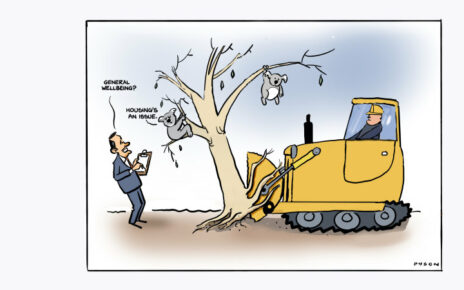Don’t Worry Darling
Directed by Olivia Wilde
Written by Katie Silberman
123 minutes, rated M
General release
★★★½
Undermining the myth of the picture-perfect 1950s has long been a favourite Hollywood pastime – indeed, ever since the actual 1950s, as anyone can attest who has seen Douglas Sirk’s ferocious 1959 masterpiece Imitation of Life.
But as the era fades from collective memory, much of what lingers as an afterimage is a modified version of that myth, which can now serve as a shorthand metaphor for oppression past and present, while emanating the glamour of a foreign country where they do things differently.
Florence Pugh and Harry Styles living the perfect life in Don’t Worry Darling. Credit:
This is the paradox animating Olivia Wilde’s cheerfully paranoid feminist allegory Don’t Worry Darling, her second feature as director following the ultra-contemporary teen comedy Booksmart (screenwriter Katie Silberman is credited with the final version of both scripts).
With its studious left-liberal heroines, Booksmart could be taken as a manifesto for a possible future, or perhaps a glimpse of a parallel universe had the 2016 US election gone the other way. Here, the game plan is to whisk us back to a retro dystopia that takes a few hints from both The Handmaid’s Tale and Mad Men – not somewhere you’d want to live, most likely, but at least fun to daydream about.
The setting is not just the literal 1950s, but something like the 1950s squared. Hidden away in the Californian desert, the town of Victory is an oasis of affluence and leisure unknown to the wider world, comparable to the “secret cities” created for families of the scientists who worked on the Manhattan Project and its successors.
It’s a streamlined community geared to traditional values, largely populated by affluent, youthful married couples who have relocated in search of a better life. The film’s visual surface is immediately enticing, all palm trees, wide open spaces, shiny gadgets and mid-century modernist architecture (the locations were in Palm Springs, and include landmark buildings by Richard Neutra and others).
The heroine Alice (Florence Pugh) stands out for her choice not to have children, but otherwise she and her scientist husband Jack (Harry Styles) lead a life no different from the rest. Each day he departs by trolley-bus to work underground on the enigmatic Victory Project, while she stays home to tend to the housework and gossip poolside with the other wives.
“There’s beauty in control,” intones Frank (Chris Pine), not just the brains behind the Victory Project but the town’s all-round masterful father figure. Wilde has publicly linked the character with incel guru Jordan Peterson, though Pine is frankly much more of a charismatic hunk than this might suggest.
Jack is less of an alpha type, nor is Styles as strong a presence in acting terms. But he is, on the other hand, Harry Styles, portraying an outwardly loving and supportive husband – who is also a dedicated and unselfish lover, as the film goes out of its way to show us in two separate scenes.
All up, if there were a chance of moving into Victory there are many reasons you might want to join the waiting list. There is of course a dreadful secret at the town’s heart: the exact nature of the dreadfulness can’t be revealed in a review, but the details matter less than you might suppose, in a film propelled by dream logic far more than the strict plot kind.
The whole thing is a metaphor – but a metaphor for what? On the face of it, no potential viewer of Don’t Worry Darling needs to be told that 1950s America was repressive or that patriarchy is a Bad Thing. Nonetheless, the film sets out to lure us into the retro fantasy so that we can share the shock of Alice’s awakening – which looks a lot like a mental breakdown, with Pugh acting in a much more realistic register than anyone else.
Is Wilde trying to tell us that the 1950s never truly ended, or that what they represent is back with a vengeance? Either way what does that imply about the dreams Hollywood has been selling us all along? Even following the last-minute revelations, little is truly clear. But if even being married to Harry Styles could be a trap, there are definitely things to worry about.
A cultural guide to going out and loving your city. Sign up to our Culture Fix newsletter here.
Most Viewed in Culture
From our partners
Source: Read Full Article


